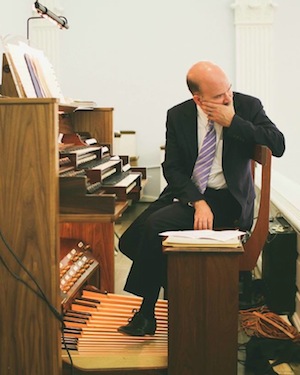
A few weeks ago, a friend of mine was telling me about the first time her partner accompanied her to the PC(USA) General Assembly. She told me that they were there to be a witness to the Church, to join their voices with many others in calling for the full welcome, inclusion, and affirmation of God’s lesbian, gay, bisexual, transgender, and queer children.[1] She told me about their experience in the opening worship of the Assembly. She said that during the service, her partner reached into her purse, pulled out a neon yellow highlighter, and methodically highlighted every part of the liturgy that expressed the simple sentiment that all were welcome. After the beautiful worship service, her partner showed her the marked up bulletin and said, “I wonder if we mean it this year.”
I found myself thinking about my friends and their yellow highlighter the first time I flipped through Glory to God. I wondered how much of the new hymnal would find itself emblazoned with bright yellow ink; I wondered with my friend and with LGBTQ people across the church if we really mean it this year.
The good news is that Glory to God is brimming with references to welcome and justice. There are twenty-six hymns grouped together in the section entitled “Justice and Reconciliation.” The topical index lists nineteen under the heading “Welcome” and another twenty-eight under “Justice.” Indeed, the Presbyterian Committee on Congregational Song’s Theological Vision Statement names “the seeking… of God’s justice” as one of the important motifs it intended to carry from previous hymnals into the current collection. If we agree with the Committee that the hymnal “gives voice to the church’s core beliefs and theological convictions,” then it certainly seems that justice and welcome are ideas that we value in our life together. And thanks be to God for that.
___________________________________________
I’ve been thinking a lot about what happens when queer people walk into our churches and sing one of the 73 songs classified in the hymnal as being about justice or welcome.
___________________________________________
But still, I wonder if we really mean it. There is no question in my mind that we have taken positive steps. Since the ratification of Amendment 10-A and the elimination of the most formal barriers to the ordination of partnered queer candidates for ministry, a number of called and gifted ministers have been ordained and are already enriching the church in new ways. There are intentionally welcoming churches affiliated with More Light Presbyterians, The Covenant Network of Presbyterians, and Presbyterian Welcome in nearly every state in our country. The LGBTQ movement in our church is a leader among its ecumenical peers, as exemplified by the appointment of the first transgender man to lead a mainline denominational organization in the United States. Presbyterian faith leaders are taking the lead in advocating for more justice for LGBTQ people in every aspect of society, such as those Teaching Elders who joined with the Why Marriage Matters New Mexico campaign to call for the freedom to marry for all couples in my home state.[2] In these ways and many more, we are increasingly living into the words of Shirley Erena Murray’s popular hymn “For Everyone Born.” (#769), delighting God by becoming creators of justice and joy.
 With such advancements of welcome, inclusion, and justice for LGBTQ people in our church, it’s easy to sing about justice from our hymnal triumphantly, even to become self-congratulatory. We sing in Hymn #749, “Come! Live in the Light!,” that “we are called to act with justice,” and I’m afraid that too often we equate our successes so far with having fully answered that calling. We sing in Hymn #399 that “God welcomes all, strangers and friends,” and I’m afraid that too many of us think that simply singing those words suffices to imitate God’s radically inclusive welcome. I’m afraid that when we sing about diversity in Hymn #401, “Gather Us In,” we forget about the places in our churches where we have not yet succeeded in creating a culture of diversity. I’m afraid that others succumb to these temptations to triumphalist thought because I know I surely have and surely will again.
With such advancements of welcome, inclusion, and justice for LGBTQ people in our church, it’s easy to sing about justice from our hymnal triumphantly, even to become self-congratulatory. We sing in Hymn #749, “Come! Live in the Light!,” that “we are called to act with justice,” and I’m afraid that too often we equate our successes so far with having fully answered that calling. We sing in Hymn #399 that “God welcomes all, strangers and friends,” and I’m afraid that too many of us think that simply singing those words suffices to imitate God’s radically inclusive welcome. I’m afraid that when we sing about diversity in Hymn #401, “Gather Us In,” we forget about the places in our churches where we have not yet succeeded in creating a culture of diversity. I’m afraid that others succumb to these temptations to triumphalist thought because I know I surely have and surely will again.
Because the truth is that we still have a lot to do if we want to see a church that’s marked by welcome, inclusion, and justice. Same-sex couples in our church still don’t enjoy the freedom to marry, and invariably, when the topic is broached by our governing councils, our fellow Presbyterians say things that hurt us deeply. Despite what’s already been said about meaningful descriptions of justice and affirmation in the new hymnal, I have yet to find an explicit mention of gender and sexual minorities in Glory to God.[3] Our work for justice too often focuses on gay and lesbian people to the exclusion of bisexual, transgender, and other queer people. An anonymous contributor to this publication described the ways in which we erase the experiences of bisexual people, and her very anonymity is one of many testimonies to the continued injustices of the preparation and ordination process for LGBTQ people, even two years after the implementation of 10-A. Too many of us know from painful firsthand experience that people committed to justice for queer people are no more immune to participation in sinful systems like racism, classism, sexism, and ableism than anyone else.
 Maybe that’s what we ought to mean when we sing those songs that my friend would mark up with her yellow highlighter. We don’t sing about justice to congratulate ourselves for how just we are, or even to triumph at an improvement in our church’s commitment to full welcome and affirmation. Singing about justice must be an expression of aspiration and challenge. When we sing about God’s justice tearing every tyrant from their throne, as we do in Hymn #100, “My Soul Cries Out With a Joyful Shout,” it seems to me that we ought to repent of the ways in which we ourselves are tyrants. When we ask God in Hymn #754 to “Help us Accept Each Other as Christ Accepted Us,” we ought to do so with humble recognition of our failures to truly do so, even as the rainbow flag flies outside our door. When we sing Archbishop Desmond Tutu’s classic proclamation that “love is stronger than hate” in Hymn #750, “Goodness is Stronger Than Evil”, we ought to remember that hate is a real force in our world – and that we participate in it more than we would care to admit. And maybe above all, we ought to feel the depth of conviction and challenge in the words of Hymn #773, “Heaven Shall Not Wait.”
Maybe that’s what we ought to mean when we sing those songs that my friend would mark up with her yellow highlighter. We don’t sing about justice to congratulate ourselves for how just we are, or even to triumph at an improvement in our church’s commitment to full welcome and affirmation. Singing about justice must be an expression of aspiration and challenge. When we sing about God’s justice tearing every tyrant from their throne, as we do in Hymn #100, “My Soul Cries Out With a Joyful Shout,” it seems to me that we ought to repent of the ways in which we ourselves are tyrants. When we ask God in Hymn #754 to “Help us Accept Each Other as Christ Accepted Us,” we ought to do so with humble recognition of our failures to truly do so, even as the rainbow flag flies outside our door. When we sing Archbishop Desmond Tutu’s classic proclamation that “love is stronger than hate” in Hymn #750, “Goodness is Stronger Than Evil”, we ought to remember that hate is a real force in our world – and that we participate in it more than we would care to admit. And maybe above all, we ought to feel the depth of conviction and challenge in the words of Hymn #773, “Heaven Shall Not Wait.”
___________________________________________
We don’t sing about justice to congratulate ourselves for how just we are, or even to triumph at an improvement in our church’s commitment to full welcome and affirmation. Singing about justice must be an expression of aspiration and challenge.
___________________________________________
I’ve been thinking a lot about what happens when queer people walk into our churches and sing one of the 73 songs classified in the hymnal as being about justice or welcome. I wonder if they’ll start itching for their yellow highlighters. I wonder if they’ll ask themselves if we really mean it. I wonder how we’ll answer that question.
[1] For those who might be unfamiliar or uncomfortable with my use of the word “queer” to describe myself and my community, I recommend this piece by my friend John Russell Stanger as one starting point.
[2] In the spirit of full disclosure, you should know I previously worked with the Why Marriage Matters NM campaign.
[3] This is based on a cursory, but reasonably thorough, perusal of the hymnal. Please do let me know in the comments if I missed something.
AUTHOR BIO: Daniel Williams has been organizing in his communities since he was a high school student in Albuquerque, NM. His organizing experience includes work on student mobilization, worker justice, LGBTQ inclusion, reproductive justice, and numerous electoral campaigns. When he’s not plotting the overthrow of oppressive systems (and very often when he is), he is pursuing his studies at Austin Presbyterian Theological Seminary.
More from Advent III: JOY at Being Included.
Read more articles in this series.






Unbound Social